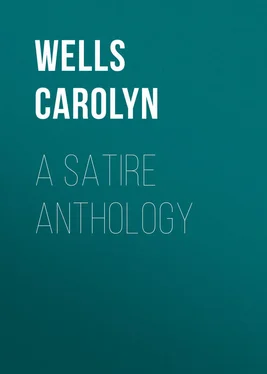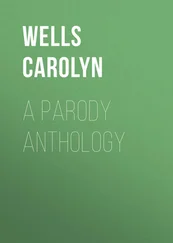Carolyn Wells - A Satire Anthology
Здесь есть возможность читать онлайн «Carolyn Wells - A Satire Anthology» — ознакомительный отрывок электронной книги совершенно бесплатно, а после прочтения отрывка купить полную версию. В некоторых случаях можно слушать аудио, скачать через торрент в формате fb2 и присутствует краткое содержание. Жанр: Юмористические книги, foreign_humor, на английском языке. Описание произведения, (предисловие) а так же отзывы посетителей доступны на портале библиотеки ЛибКат.
- Название:A Satire Anthology
- Автор:
- Жанр:
- Год:неизвестен
- ISBN:нет данных
- Рейтинг книги:5 / 5. Голосов: 1
-
Избранное:Добавить в избранное
- Отзывы:
-
Ваша оценка:
- 100
- 1
- 2
- 3
- 4
- 5
A Satire Anthology: краткое содержание, описание и аннотация
Предлагаем к чтению аннотацию, описание, краткое содержание или предисловие (зависит от того, что написал сам автор книги «A Satire Anthology»). Если вы не нашли необходимую информацию о книге — напишите в комментариях, мы постараемся отыскать её.
A Satire Anthology — читать онлайн ознакомительный отрывок
Ниже представлен текст книги, разбитый по страницам. Система сохранения места последней прочитанной страницы, позволяет с удобством читать онлайн бесплатно книгу «A Satire Anthology», без необходимости каждый раз заново искать на чём Вы остановились. Поставьте закладку, и сможете в любой момент перейти на страницу, на которой закончили чтение.
Интервал:
Закладка:
ON SHADWELL
ALL human things are subject to decay,
And, when Fate summons, monarchs must obey.
This Flecknoe found, who, like Augustus, young
Was called to empire, and had governed long.
In prose and verse was owned, without dispute,
Through all the realms of Nonsense absolute.
This aged prince, now flourishing in peace,
And blest with issue of a large increase,
Worn out with business, did at length debate
To settle the succession of the state;
And pondering which of all his sons was fit
To reign, and wage immortal war with Wit,
Cried: “’Tis resolved; for Nature pleads that he
Should only rule who most resembles me.
Shadwell alone my perfect image bears,
Mature in dulness from his tender years;
Shadwell alone of all my sons is he
Who stands confirmed in full stupidity.
The rest to some faint meaning make pretence,
But Shadwell never deviates into sense.
Some beams of wit on other souls may fall,
Strike through, and make a lucid interval,
But Shadwell’s genuine night admits no ray;
His rising fogs prevail upon the day.
Besides, his goodly fabric fills the eye,
And seems designed for thoughtless majesty —
Thoughtless as monarch oaks that shade the plain,
And, spread in solemn state, supinely reign.
Heywood and Shirley were but types of thee,
Thou last great prophet of tautology!
Even I, a dunce of more renown than they,
Was sent before but to prepare thy way.”
SATIRE ON EDWARD HOWARD
THEY lie, dear Ned, who say thy brain is barren,
When deep conceits, like maggots, breed in carrion.
Thy stumbling foundered jade can trot as high
As any other Pegasus can fly.
So the dull eel moves nimbler in the mud
Than all the swift-finned racers of the flood.
As skilful divers to the bottom fall
Sooner than those who cannot swim at all,
So in this way of writing, without thinking,
Thou hast a strange alacrity in sinking.
ST. ANTHONY’S SERMON TO THE FISHES
SAINT ANTHONY at church
Was left in the lurch,
So he went to the ditches
And preached to the fishes.
They wriggled their tails,
In the sun glanced their scales.
The carps, with their spawn,
Are all thither drawn;
Have opened their jaws,
Eager for each clause.
No sermon beside
Had the carps so edified.
Sharp-snouted pikes,
Who keep fighting like tikes,
Now swam up harmonious
To hear Saint Antonius.
No sermon beside
Had the pikes so edified.
And that very odd fish,
Who loves fast-days, the cod-fish —
The stock-fish, I mean —
At the sermon was seen.
No sermon beside
Had the cods so edified.
Good eels and sturgeon,
Which aldermen gorge on,
Went out of their way
To hear preaching that day.
No sermon beside
Had the eels so edified.
Crabs and turtles also,
Who always move low,
Made haste from the bottom
As if the devil had got ’em.
No sermon beside
The crabs so edified.
Fish great and fish small,
Lords, lackeys, and all,
Each looked at the preacher
Like a reasonable creature.
At God’s word,
They Anthony heard.
The sermon now ended,
Each turned and descended;
The pikes went on stealing,
The eels went on eeling.
Much delighted were they,
But preferred the old way.
The crabs are backsliders,
The stock-fish thick-siders,
The carps are sharp-set —
All the sermon forget.
Much delighted were they,
But preferred the old way.
INTRODUCTION TO THE TRUE-BORN ENGLISHMAN
SPEAK, satire; for there’s none can tell like thee
Whether ’tis folly, pride, or knavery
That makes this discontented land appear
Less happy now in times of peace than war?
Why civil feuds disturb the nation more
Than all our bloody wars have done before?
Fools out of favour grudge at knaves in place,
And men are always honest in disgrace;
The court preferments make men knaves in course,
But they which would be in them would be worse.
’Tis not at foreigners that we repine,
Would foreigners their perquisites resign;
The grand contention’s plainly to be seen,
To get some men put out, and some put in.
For this our senators make long harangues,
And florid members whet their polished tongues.
Statesmen are always sick of one disease,
And a good pension gives them present ease;
That’s the specific makes them all content
With any king and any government.
Good patriots at court abuses rail,
And all the nation’s grievances bewail;
But when the sovereign’s balsam’s once applied,
The zealot never fails to change his side;
And when he must the golden key resign,
The railing spirit comes about again.
Who shall this bubbled nation disabuse,
While they their own felicities refuse,
Who the wars have made such mighty pother,
And now are falling out with one another:
With needless fears the jealous nation fill,
And always have been saved against their will:
Who fifty millions sterling have disbursed,
To be with peace and too much plenty cursed:
Who their old monarch eagerly undo,
And yet uneasily obey the new?
Search, satire, search; a deep incision make;
The poison’s strong, the antidote’s too weak.
’Tis pointed truth must manage this dispute,
And downright English, Englishmen confute.
Whet thy just anger at the nation’s pride,
And with keen phrase repel the vicious tide;
To Englishmen their own beginnings show,
And ask them why they slight their neighbours so.
Go back to elder times and ages past,
And nations into long oblivion cast;
To old Britannia’s youthful days retire,
And there for true-born Englishmen inquire.
Britannia freely will disown the name,
And hardly knows herself from whence they came;
Wonders that they of all men should pretend
To birth and blood, and for a name contend.
Go back to causes where our follies dwell,
And fetch the dark original from hell.
Speak, satire, for there’s none like thee can tell.
AN EPITAPH
INTERRED beneath this marble stone
Lie sauntering Jack and idle Joan.
While rolling threescore years and one
Did round this globe their courses run.
If human things went ill or well,
If changing empires rose or fell,
The morning past, the evening came,
And found this couple just the same.
They walked and ate, good folks. What then?
Why, then they walked and ate again;
They soundly slept the night away;
They did just nothing all the day,
Nor sister either had, nor brother;
They seemed just tallied for each other.
Their moral and economy
Most perfectly they made agree;
Each virtue kept its proper bound,
Nor trespassed on the other’s ground.
Nor fame nor censure they regarded;
They neither punished nor rewarded.
He cared not what the footman did;
Her maids she neither praised nor chid;
So every servant took his course,
And, bad at first, they all grew worse;
Slothful disorder filled his stable,
And sluttish plenty decked her table.
Their beer was strong, their wine was port;
Their meal was large, their grace was short.
They gave the poor the remnant meat,
Just when it grew not fit to eat.
They paid the church and parish rate,
And took, but read not, the receipt;
For which they claimed their Sunday’s due
Of slumbering in an upper pew.
No man’s defects sought they to know,
So never made themselves a foe.
No man’s good deeds did they commend,
So never raised themselves a friend.
Nor cherished they relations poor,
That might decrease their present store;
Nor barn nor house did they repair,
That might oblige their future heir.
They neither added nor confounded;
They neither wanted nor abounded.
Nor tear nor smile did they employ
At news of grief or public joy.
When bells were rung and bonfires made,
If asked, they ne’er denied their aid;
Their jug was to the ringers carried,
Whoever either died or married.
Their billet at the fire was found,
Whoever was deposed or crowned.
Nor good, nor bad, nor fools, nor wise;
They would not learn, nor could advise;
Without love, hatred, joy, or fear,
They led – a kind of – as it were;
Nor wished, nor cared, nor laughed, nor cried.
And so they lived, and so they died.
Интервал:
Закладка:
Похожие книги на «A Satire Anthology»
Представляем Вашему вниманию похожие книги на «A Satire Anthology» списком для выбора. Мы отобрали схожую по названию и смыслу литературу в надежде предоставить читателям больше вариантов отыскать новые, интересные, ещё непрочитанные произведения.
Обсуждение, отзывы о книге «A Satire Anthology» и просто собственные мнения читателей. Оставьте ваши комментарии, напишите, что Вы думаете о произведении, его смысле или главных героях. Укажите что конкретно понравилось, а что нет, и почему Вы так считаете.












